October 5 - 11, 2014: Issue 183
Resch's Beer Art - A Reflection of Australiana Now Worth Thousands
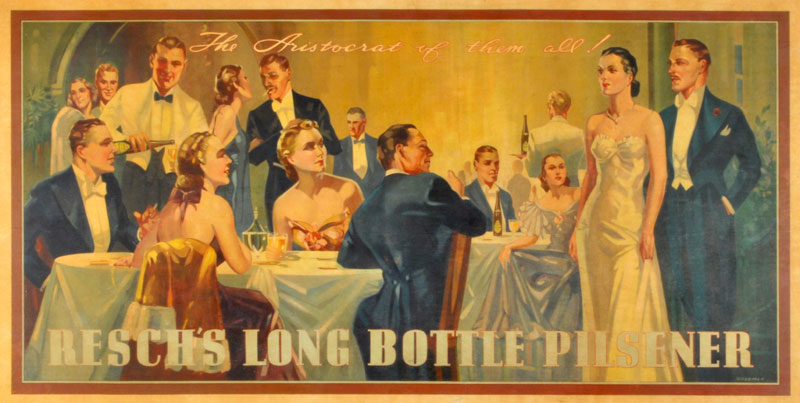
Rupert 'Tom' Woodman Aus. 1901-1959 - The Aristocrat Of Them All! Resch's Long Bottle Pilsener, c1930s. Colour process lithograph, signed in image lower right, 55 x 94.8cm. Stains, repaired missing portions, tears and creases overall. Linen-backed.
After immigrating from Britain to Australia in 1924 Tom Woodman worked as a magazine illustrator and theatre set painter before moving to Sydney during the 1930s. From 1936 Woodman made a career producing pub paintings and other graphic work for Tooth & Co. Ref: Powerhouse Museum. - $2,850 See more at Josef Lebovic Gallery
Resch's Beer Art - A Reflection of Australiana Now Worth Thousands
As we head into warmer weather palate cleansing ales and wine spritzers become more and more popular - as do the places we sup such sips. If you're not dangling bare feet off a wharf in salty water while warming westerlies fan your tresses back, beer commercial style, then the province of many an Australian, the man cave or beer shed, or even a lovely long veranda facing the waters and breezes, may be your preference.
The decoration of such corners has led many a collector of the Australiana to indulge in favourite posters depicting favourite sports or landscape scenes with a beer type or maker. Nowadays beer posters and mirrors done by our early commercial artists, who were often successful and sought after portrait artists or worked in other artistic fields as well, are fetching hundreds for prints, and even thousands of dollars for an original. It's not just beer posters either, fruit, travel, anything that is rare or Australian is fetching good prices - so don't throw out those old 1920's to 1950's flour bags or promotional material just yet!
James Cockington's 'Beer with A View' (Sydney Morning Herald - January 17th, 2007) points out that people used to scrape off the artwork from these mirrors in order to resell/recycle the glass - thereby depriving themselves of some genuine developments in creating art, along with a touch of science, and perhaps selling for pennies what is actually now worth many pounds!
.....one especially notable decorative feature of Australian pubs developed in the 1920s and 1930s – the iconic paint-on-glass beer advertisement.
This distinctive Australian graphic genre probably evolved from the elaborate back-painted bar mirrors of the 19th century. Often mounted on the outer walls of pubs, these eye-catching pieces were not printed posters or standard paintings. They were elaborate craft products created by teams of skilled commercial artists, many of whom were employed by the breweries for their entire working lives.
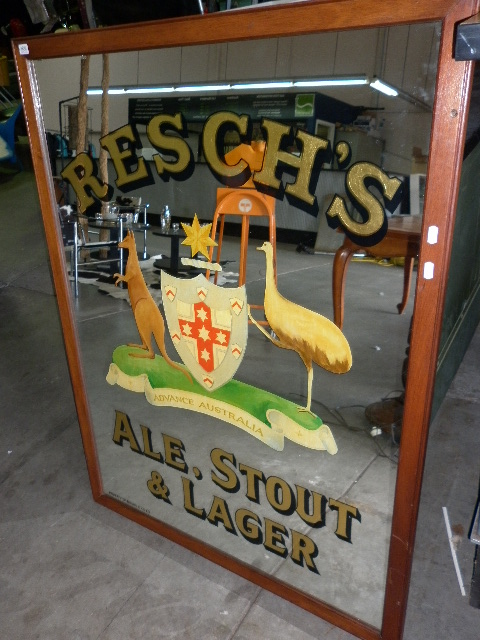
Left: Lawson’s Auctioneers – 2012: Vintage Reschs Pub Mirror with Kangaroo, Emu and Coat of Arms: Sold for $2,000
The creation of these beer ads was a specialised craft – they were entirely hand-painted in reverse on thick glass, and then wall-mounted in heavy brass frames, which were kept highly polished. Some exterior displays were made with translucent paint, so that they could be illuminated from behind. They featured striking and often highly stylised designs and compositions, painted in vibrant colours, and in many cases the text and some parts of the graphic were accentuated with real gold leaf.
They varied in size, but the larger examples were as much as a square metre in size or more. Like the example below, they typically depicted archetypal 'Aussie' sporting scenes – swimming, surfing, sailing, horse-racing, cricket or football – or social events such as picnics, dances and parties.
Many Deco-style pubs had sections of curved façade, because a large proportion of Australian pubs are built on street corners, and these spaces were often highlighted by the large curved frames of these colourfully painted beer ads.
Because of their inherent fragility and location, many of these marvellous works either deteriorated beyond repair or were destroyed by accident or vandalism. Over the years, as advertising materials (and the pubs themselves) were progressively modernised during the late 20th century, almost all the hand-painted beer ads were removed, but their distinctive style has become well-recognised and much-loved, and they are still a reference point in modern Australian commercial art. The best surviving examples are now museum pieces and expensive collectors' items. (1.)
As there are a few drinkers of the ancient brew of beer who regularly linger around here of a Friday or Sunday afternoon, and as we are heading into beer-drinking season (although some point out everyday is 'beer-o'clock at some stage of the day) - a few pages on the art of beer, or art associated with beer, may make you pause from throwing out that slightly faded framed testament to how good beer can be for you when consumed in moderation.
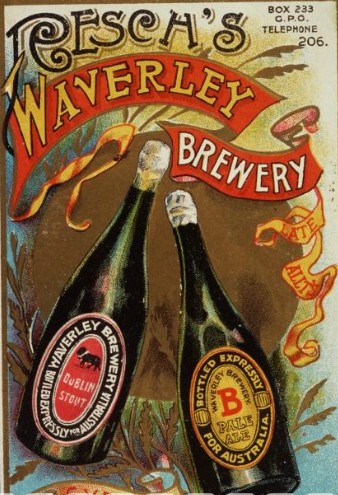 One of the early proponents of this commercial 'art form' was Resch's:
One of the early proponents of this commercial 'art form' was Resch's:
Right: Powerhouse Museum - Tooth Collection: Calendar Booklet, "Resch's Waverley Brewery", 1898-1899
The Resch family (brothers Edmund: 1847-1923, Richard Frederick Edward Nicholas:1851-1912 and Emil Karl:1860-1930) produced a range of beer kinds alluded to as purer due to the manner they were made, the qualities of their beers and what was not in them - so much so that those making their posters and advertisements associated their product with good health and sport - and even as an 'aristocrat' of beers at one stage.
In 1901 Edmund Resch told Richard Meagher of the Legislative Assembly select committee on 'tied houses', that he was the only brewer in N.S.W. who did not use 'salicylic acid and other antiseptics' in his beer, among other points the inquiry was investigating:
Mr. E. Resch's Evidence.
Before the Parliamentary Select Committee in Sydney on the question of "tied" hotels, Edmund Resch stated that he purchased his brewery about four years ago. He was advised by his solicitor to attorn his weekly tenancies. He did not think the attornments to be a weekly tenant were in existence before he bought the place. If a man in-tended to go honestly the attornment was no detriment to him in any shape or form.
The chairman: Does a licensee not only hand himself, so to speak, over to you body and soul, but also actually hands over his license to you?—Quite right, too.
Do you consider it right to induce a man to commit a very grave breach of the law ?—I do not think it is a breach of the law.
Do you not know that the Licensing Act expects a man to have his license always on his premises, where it can be seen ?—Yes ;there is a clause to that effect, but you will also find the words "unless reasonable excuse can be given."
Yes, if a man's license were burned by accident in his bedroom, that would probably be a reasonable excuse ; but have you never heard of a man being fined for not having his license on his premises ?—No; never.
And how long have you been here ?—About six years.
And you have never heard of a person being prosecuted for not having his license ?-No ; I have not.
Witness went on to say that he paid the license fees for some people who could not pay. They had paid, he thought, £330 for these licences, and they had absolutely no security for that sum. In the resumption area there was absolutely no security—and it was this district he referred to. They had made application for payment from the Government and had been refused. Only that morning the licenses were demanded, and he refused to give them up. Personally he only used hops, malt, sugar, yeast, and water in making his beer. He did not use salicylic acid at all, but he could not say what other breweries used. So far as advances to publicans were concerned he personally wished there were none. It had been stated that a certain traveller went round and spent £800 a month, and that he (the witness) thought was a worse form of "tie" than anything of the sort he had, which he regarded as a legal "tie." Travellers would find that when they came to a house the licensee would say, "Well, I would like to take your beer," but when the traveller put on the counter perhaps 5s., and another traveller came in and threw as many sovereigns across the counter, no business would be done by the first comer. In Adelaide some publicans were practically share-holders in a brewery, and if a man came along and said there was a hotel which he could get for such a sum he would be asked how much money he possessed. Perhaps he had £150, and the cost of the hotel would be £1500. The brewery might find the balance, the applicant saying he would give the brewery his trade, and thus the brewery ran a greater risk than did the tenant. In his view it did not really pay a brewery to run an hotel. He had read Mr Meagher's (the chairman's) bill, and thought it would create a greater evil than now exists. He would like to see all the houses untied, but what was the good of that if by the passage of this bill a worse state of things was to be created? In his view the State should compensate the holders of tied houses for the money invested ; and his reason was that if a person owed a certain sum of money and by new legislation brought about in the interests of the public generally the credit or entirely lost the money which was owing to him, surely the individual should not suffer.
To Mr. Fegan : He knew there were cases where persons had gone into hotels with perhaps £500 or £600 and come out with nothing, but this was due to bad business capabilities on the part of the licensees. He had had an agreement with two breweries that they should not attack his tied houses.
The chairman: When wealthy breweries in their anxiety to secure an hotel make advances considerably out of all proportion to the values, does not that very condition of affairs infer that a man who comes in under these conditions carries upon his back a load he can never remove? —It does in some cases. Of course if one enters into business transactions of any sort he must carry them out, and he comes in with his eyes open. Mr. E. Resch's Evidence. (1901, September 14). Barrier Miner(Broken Hill, NSW : 1888 - 1954), p. 5. Retrieved fromhttp://nla.gov.au/nla.news-article44298521
Resch's (Sydney) was created by Edmund Resch who came to Australia at age 16:
LATE MR. E. RESCH. FUNERAL AT WAVERLEY.
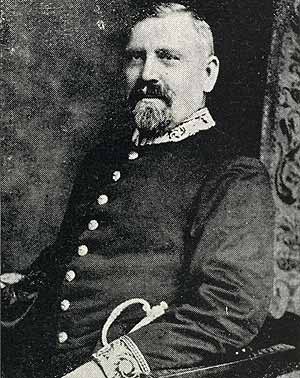 The funeral of the late Mr. Edmund Resch, which took place yesterday, was very largely attended by his friends and business associates, about 600 people being present. Numerous wreaths, many of them from his employees, were sent. The cortege left his late home at Darling Point for the Waverley Cemetery. The chief mourners were his two sons. Messrs. Edmund and Arnold Resch, and his brother, Mr, Emil Resch, of Melbourne.
The funeral of the late Mr. Edmund Resch, which took place yesterday, was very largely attended by his friends and business associates, about 600 people being present. Numerous wreaths, many of them from his employees, were sent. The cortege left his late home at Darling Point for the Waverley Cemetery. The chief mourners were his two sons. Messrs. Edmund and Arnold Resch, and his brother, Mr, Emil Resch, of Melbourne.
Among those who attended the funeral were Messrs. W. O. Hopkins (manager), Resch's. Ltd.), John Stewart, and G. Greig (auditors), Cleary and T. Breheny (Tooth and Co., Ltd.), F. Bligh (Hartbottle.&* Coy J.I. Toohey (Toohey's, Ltd.). A. C. Willis (E. S. and A. Bank), Geo. Wright(John Dewar and Sons, Ltd.), Albert Llttlejt h and Mitchell (Scott, Henderson, and Co.),L. D. Smith (J. Buchanan, Ltd.), J. L. Ruthven (John Walker and Sons), W. F. Gardonand J. Rnnkln (The Distillers Co.), W" C.Fisher (Moses, Moss, and Co., Ltd.). J. Ross Smith (Gollin and Co. Pty., Ltd.), A. M. Smith and W. King (Australian Glass Works). U..'eyer (Rolfs), Inspector Fullerton, J. Hoare, Superintendent Roach, H. J. Asplnall, J. Alvarez, G. Pulg, J. M. Ryan (Burges and Ryan), F. E. Barton Smith, J. M. Maughan and A.Johnson (Bradley, Son, and Muunhun). a. Mar-ti (Brewers' Association), N. Thomson and S. Goodsell (Mauri, Bros., and Thomson), R. Ferrier (Ferrier and Dickinson), E. Lindsay Thompson, P. Douglas, C. R. Halloran and P.G. Manton (Halloran and Manton). Johnson and Cooper (H. M. Customs). All the employees of the brewery and travelling and clerical staff were in attendance.
Mr. Resch was the founder of the brewing business now carried on by Resch's, Ltd. Born in 1847, he came to Australia 60 years ago. He first went to Victoria, where was engaged in mining pursuits. He came to Sydney in 1871 and went from here to the Cobar district, where he worked on the South Cobar mine, he and his mate being the first actually to strike copper in that mine. Leaving Cobar, he prospected for a year between Bourke, Cobar, Louth, and Gilgandra, afterwards going to Charters Towers, where he built a hotel. Selling out the business, on account of ill-health he went to Wilcannia, arriving there in 1877. There he bought an aerated water business and shortly afterwards erected a brewery, which he carried on till a few years ago when he transferred to his son. In 1895 he took charge of Allt's Brewing and Wine and Spirit Co., Ltd., in 1897 purchasing the whole of the assets of that company, the business of which he conducted up to the time of his death. In 1900 he purchased from the New South Wales Lager Beer Co.. Ltd., the present brewery in Redfern, to which the whole operations of the other brewery were transferred. The business was subsequently floated into a company in 1906. Mr. Resch was the Sydney Consul for the Netherlands for 12 years. He was married in 1878, and leaves a widow and his two sons, Messrs. Edmund and Arnold Resch. LATE MR. E. RESCH. (1923, May 25). The Sydney Morning Herald (NSW : 1842 - 1954), p. 14. Retrieved from http://nla.gov.au/nla.news-article16065810
Charles Mellier had a pleasing custom of giving his friends and pupils copies of compositions dedicated to them. For instance, there was the "Red Lion Galop," neatly done by hand, and presented to the two Resch boys, Ed. and Arnold, then aged about 10 and 12, sons of E. Resch, of beer fame. In the early nineties Mr. Resch had a brewery at Wilcannia named the "Red Lion," and lived there. The boys had no liking for music; they loathed it. Poor Mellier could do nothing but rave as one after another, with stolid endurance, sat through the lessons. "Talk about Germans being musical!" he would storm, "Why does your father waste his money and my time on such blockheads? Go home and roll casks or chop wood or chop your wooden heads off! and soon. Gladly would the miserable lads have rolled casks or chopped wood had they been free agents, instead of struggling with the "Red Lion Galop" and its kind. WILCANNIA MEMORIES. (1930, September 6). The Australasian (Melbourne, Vic. : 1864 - 1946), p. 4 Edition: METROPOLITAN EDITION. Retrieved fromhttp://nla.gov.au/nla.news-article140832246
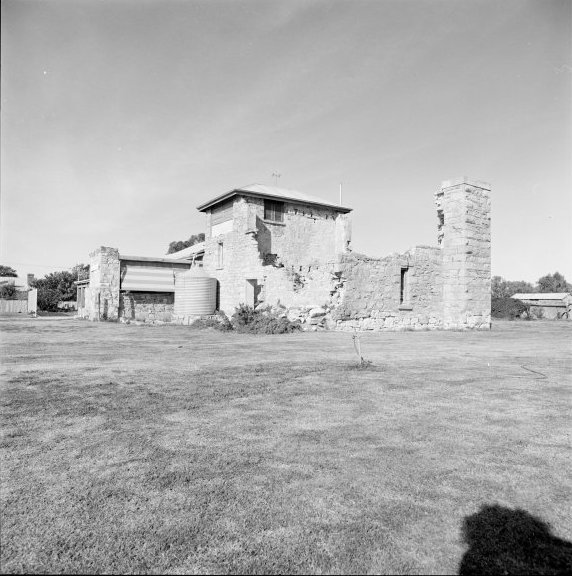
Ruin of the Edmund Resch's Red Lion Brewery, Wilcannia, New South Wales, ca. 1970 courtesy National Library of Austalia, Image No.: • nla.pic-vn5215607
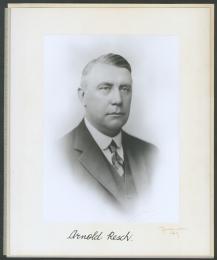 WHEN ARNOLD RESCH WORKED. Starting at 2 a.m. on several days a week, washing bottles, attending to grimy boilers, and brewing, were some of the duties of Mr. Arnold Resch when Resch’s brewery was in its infancy. Addressing his employees the other day, after he had been presented with a silver tray inscribed: 'As a token 'of respect and. esteem for his magnificent, generosity to Arnold Resch, Esq., from all the employees of Resch’s, Ltd.' Mr. Resch referred to the loyal service given by them. When Resch’s and Tooth and Co. merged recently, Mr. Resch, as a token of goodwill, made gifts to every employee, either in cash or in fully paid up shares in Tooth and Co., the value of the gifts amounting to many thousands of pounds. He told the gathering that when he began to work in the brewery only five employees were engaged. Now there were 500. 'In those days,' he said, ' we worked very long hours, commencing several days in the week at 2 and 3 a.m. I attended personally to the brewing, cellar work, and bottling. Some of the work consisted in washing the casks by hand, as we had no machinery in those days to do that. 'We filled the bottles with an open siphon and affixed the labels by hand. WHEN ARNOLD RESCH WORKED. (1930, January 23).Mullumbimby Star (NSW : 1906 - 1936), p. 3. Retrieved fromhttp://nla.gov.au/nla.news-article128612504
WHEN ARNOLD RESCH WORKED. Starting at 2 a.m. on several days a week, washing bottles, attending to grimy boilers, and brewing, were some of the duties of Mr. Arnold Resch when Resch’s brewery was in its infancy. Addressing his employees the other day, after he had been presented with a silver tray inscribed: 'As a token 'of respect and. esteem for his magnificent, generosity to Arnold Resch, Esq., from all the employees of Resch’s, Ltd.' Mr. Resch referred to the loyal service given by them. When Resch’s and Tooth and Co. merged recently, Mr. Resch, as a token of goodwill, made gifts to every employee, either in cash or in fully paid up shares in Tooth and Co., the value of the gifts amounting to many thousands of pounds. He told the gathering that when he began to work in the brewery only five employees were engaged. Now there were 500. 'In those days,' he said, ' we worked very long hours, commencing several days in the week at 2 and 3 a.m. I attended personally to the brewing, cellar work, and bottling. Some of the work consisted in washing the casks by hand, as we had no machinery in those days to do that. 'We filled the bottles with an open siphon and affixed the labels by hand. WHEN ARNOLD RESCH WORKED. (1930, January 23).Mullumbimby Star (NSW : 1906 - 1936), p. 3. Retrieved fromhttp://nla.gov.au/nla.news-article128612504
We include this little item regarding one of Edmund's sons, Arnold, as this gentleman was later killed during WWII in Germany after being taken around 1942 from Jersey on the Channel Islands during their occupation by the Germans. He had moved there with his wife and children in 1936. AUSTRALIAN BREWER DEAD. (1945, June 19). The Riverine Grazier (Hay, NSW : 1873 - 1954), p. 2. Retrieved fromhttp://nla.gov.au/nla.news-article136628544,
A tragic irony considering what his father and he and his brother experienced in WWI despite being born in Australia:
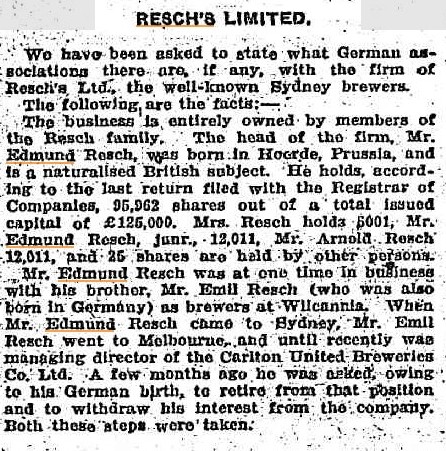 Article to Right from: RESCH'S LIMITED. (1915, October 3). The Mirror of Australia(Sydney, NSW : 1915 - 1917), p. 3. Retrieved fromhttp://nla.gov.au/nla.news-article104643999
Article to Right from: RESCH'S LIMITED. (1915, October 3). The Mirror of Australia(Sydney, NSW : 1915 - 1917), p. 3. Retrieved fromhttp://nla.gov.au/nla.news-article104643999
RESCH'S BREWERY - STATE CANNOT TAKE OVER - We have received a number of communications in regard to Resch's Brewery, drawing attention to the necessity of closing it because the proprietor is German-born. We have purposely refrained from saying anything in connection with this matter, because we felt it was inadvisable that any drastic action should be taken unless it was assured that the Australian employees of the firm would not lose their livelihood by reason thereof. There are some hundreds of those connected directly or indirectly with Resch's Brewery and so long as |none of the profits of the company are going out of Australia and only Australian material is used and the products sold within the Commonwealth, it was felt that immediate action—unless some assurance to Australian employers was given — would be unfair. Having this in view, Mr. Hall, State Attorney-General, was asked by the 'Sunday Times' if it would be possible for the Government to take over the Resch concern keep it going in the interests of the State and make the necessary arrangements to defray the cost of resumption by payment in War Loan bonds. We have now been informed by Mr. Hall that he is convinced he has not the power to interfere, and that if he took any action in the direction indicated, it would be repudiated by the Federal authority on the ground that it had not yet invested itself with the power to take the steps which should be taken. In regard to businesses in the same category as Resch's, it is very necessary that there should be an absolute guarantee to the State that none of the money earned by way of profits shall be in any way utilised to the advantage of Germany. We cannot forgot that the founder of the business in this case is German, and that his sons, who are big shareholders, are possibly as German ns the sons of German parents should be. They are employing Germans in the business, one at least of whom has not been long out here. In view of what Mr. Hall tells us, it seems very necessary that the authorities should at once, provide themselves with every facility for taking action in a case like this. RESCH'S BREWERY. (1916, February 27). Sunday Times(Sydney, NSW : 1895 - 1930), p. 9. Retrieved from http://nla.gov.au/nla.news-article1213371
'BUY RESCHS.' At a largely-attended meeting of the anti Huns of Penrith, the Mayor (Ald. Coffee) presided last night. The Town Band played in the streets, and the interest was keen. Among the speakers were a number of the members of the league of the metropolis. In view of the report that it is the intention of the Government to buy or start a brewery for the brewing of light beers, a resolution that the business of Messrs. Resch be acquired was carried. It was stated that in the employ of the local Council there was an alien, and a resolution to the effect that, if this is so, a British subject be put in his place as carried. The speeches were to the point, and there is no doubt as to the strong anti-Germanism' of the district. "BUY RESCH'S.". (1916, May 14). Sunday Times (Sydney, NSW : 1895 - 1930), p. 2. Retrieved from http://nla.gov.au/nla.news-article121339931
EDMUND RESCH INTERNED. (By Telegraph.) Later. Edmund Resch, the head of Resch's Brewery, was taken to Holdsworthy German Concentration Camp today. EDMUND RESCH INTERNED. (1917, November 27).Singleton Argus (NSW : 1880 - 1954) , p. 2. Retrieved from http://nla.gov.au/nla.news-article80707781
EDMUND RESCH - A GERMAN OF THE GERMANS FLYING THE GERMAN FLAG
We congratulate the Federal Government on deciding to intern Mr. Edmund Reach, the well-known brewer. This action should have been taken over three years ago. However, the, / decision to place the well-known German be hind barbed wire has undoubtedly given great? ' satisfaction, which It is generally hoped will be the prelude to further steps of a similar kind. Mr. Resch has always been a German of the Germans. His sympathies with the land of his birth have been freely expressed in public places, and a great many people have been able to testify to his allegiance to and sympathies with the land of his birth, which it is quite easy to understand. Before the war Mr. Resch used to fly the German flag over his palatial castle at Darling Point. There has always been a certain amount of mystery about this house, which is in a very prominent position overlooking the harbor. Although, when it was owned by the Tooth family, it needed the services of a large staff of servants, under Mr. Reach's regime these have been reduced to a small number. A portion of the house has, it is stated, been closed altogether, and the servants are not allowed to enter some of the rooms.
VISITS TO GERMANY.
Mr. Resch used to make periodical visits to the land of his birth, and had a private residence is Wiesbaden. He was in Germany when war broke out, and by some means or other, succeeded in escaping from the Fatherland, although British subjects were interned. His two sons, Arnold and Edmund, we're educated in Germany, and have made visits to that country' from time to time. At the well-known brewery at Redfern Germans have been employed as chemists and in other capacities. Practically the whole of the shares in the company are owned by Mr. and Mrs. Resch and their two sons, all of whom are full-blooded Germans.
A good many people are interested to know whether the Government proposes to take tiny action with regard to this business, and whether they propose to permit this German family to make large profits during the war in competition with British and Australian firms. In Germany all such businesses have been confiscated, and it may safely be stated that no Britisher is permitted to carry on business in ‘rivalry with' German firms and make large sums of money during the war.
Edmund Resch is widely known as one among the many thousands of his countrymen who have found in Australia the freedom which, in their own country, they would not have enjoyed, and the opportunity of amassing wealth with which, in their own country, they would, not have been furnished, had they lived to the venerable age of the late Methuselah. He was born in Germany in 1847, a native of Westphalia, and was 16 years of age when he arrived in this country. He has never since then ceased to display his interest in and love for the land of his birth. In 1863 the goldfields were the attraction for Immigrants from all the world, and the young German, though, he knew nothing of the language or the people — mostly British then-threw in his lot with the diggers, and tried his fortune on Ballarat, and later on the Turon, and some of the other fields of N.S. Wales. He had varying luck in the pursuit of the metal, and came out of his mining adventures with a little money, enough to give him a start in a business in which he saw profits.
MAKING CORDIALS AND BEER.
He made his start as a cordial manufacturer in Wilcannia, where he produced lemonade, ginger beer, and soft drinks of the kind, by the primitive processes of which he was able to avail himself. He was 40 years old at this time, and his sons were growing up and of use. He expanded his enterprise, added the brewing, of beer to the making of cordials, and soon established a large connection in the western country. For eight years he remained among the profits of this small manufactory. In 1895 he moved some of his business to the city, and stood by, on the look-out for a suitable investment for his money and congenial employment for his energies. In 1897 he bought the controlling interest in Allts brewery, then a going concern with greater possibilities, and carried this along to the point at which it was one of the considerable factors in city beer production. Two years later he attached the N.S. Wales Lager Beer Co., and out of the consolidation of the businesses came Resch's brewery. EDMUND RESCH. (1917, December 1). The Mirror (Sydney, NSW : 1917 - 1919), p. 3. Retrieved from http://nla.gov.au/nla.news-article116968832
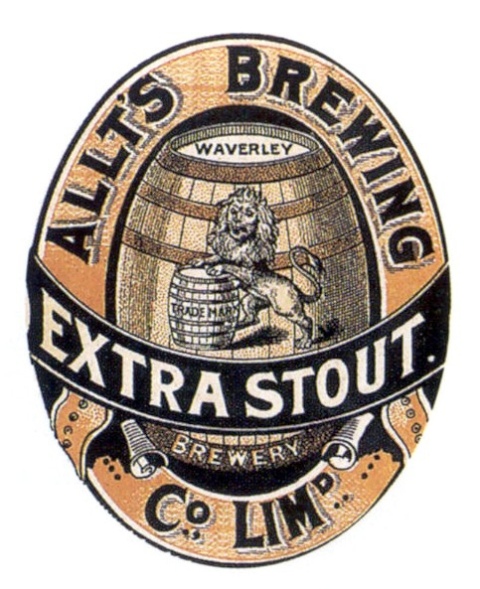 THE INTERNMENT OF EDMUND RESCH. HIS AUSTRALIAN HISTORY.
THE INTERNMENT OF EDMUND RESCH. HIS AUSTRALIAN HISTORY.Holdsworthy as a concentration Camp had a very bad reputation compared to other places of internment for citizens or near citizens of Australia during World war One:
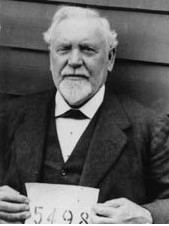 Men of German and Austrian descent were gathered and placed into the internment camp from 1914 to 1920, two years after the First World War ended. The Holsworthy Internment Camp held 6890 internees - Men were treated like prisoners and were required to work on construction sites. Some worked on building the railway from Liverpool to Holsworthy, while some grew vegetables on twenty five acres of land by the Georges River. Despite everything, the internees poured their efforts into making Holsworthy their own. “If I rest, I rust” became a popular motto of survival. The camp eventually boasted gyms, sporting grounds, small businesses, theatres and orchestras, which, aside from providing escapism, helped internees strengthen their sense of identity.
Men of German and Austrian descent were gathered and placed into the internment camp from 1914 to 1920, two years after the First World War ended. The Holsworthy Internment Camp held 6890 internees - Men were treated like prisoners and were required to work on construction sites. Some worked on building the railway from Liverpool to Holsworthy, while some grew vegetables on twenty five acres of land by the Georges River. Despite everything, the internees poured their efforts into making Holsworthy their own. “If I rest, I rust” became a popular motto of survival. The camp eventually boasted gyms, sporting grounds, small businesses, theatres and orchestras, which, aside from providing escapism, helped internees strengthen their sense of identity. 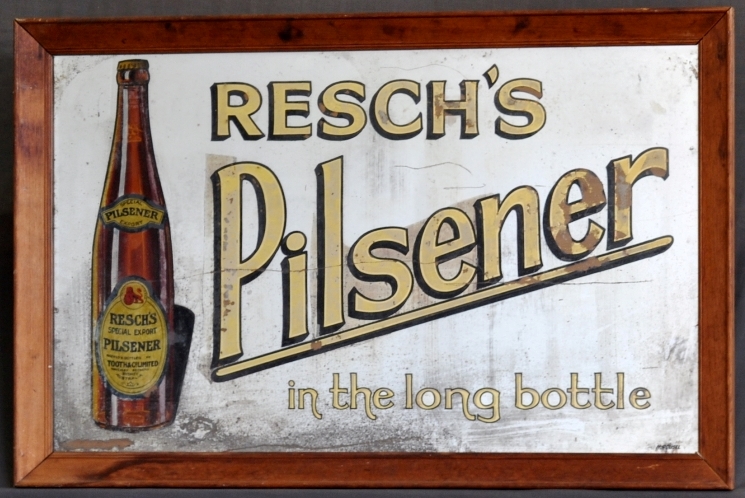
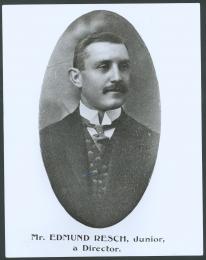 RESCH'S INCOME - SYDNEY, Nov. 28.—Mr. Justice Rich, in the High Court, directed that the assessment of Edmund Resch's income for tax purposes in 1929-40 should be reduced by £31,680 from £544,753. On the original assessment of income Resch would have been required to pay£42,245 in taxation. The order arose from an appeal by Resch. A number of questions were submitted by Mr. Justice Rich to the High Court by way of a stated case.
RESCH'S INCOME - SYDNEY, Nov. 28.—Mr. Justice Rich, in the High Court, directed that the assessment of Edmund Resch's income for tax purposes in 1929-40 should be reduced by £31,680 from £544,753. On the original assessment of income Resch would have been required to pay£42,245 in taxation. The order arose from an appeal by Resch. A number of questions were submitted by Mr. Justice Rich to the High Court by way of a stated case.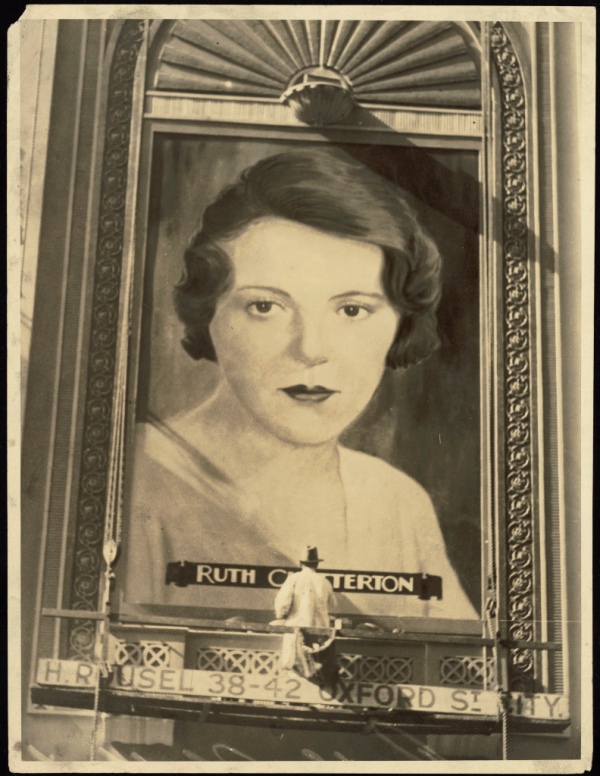
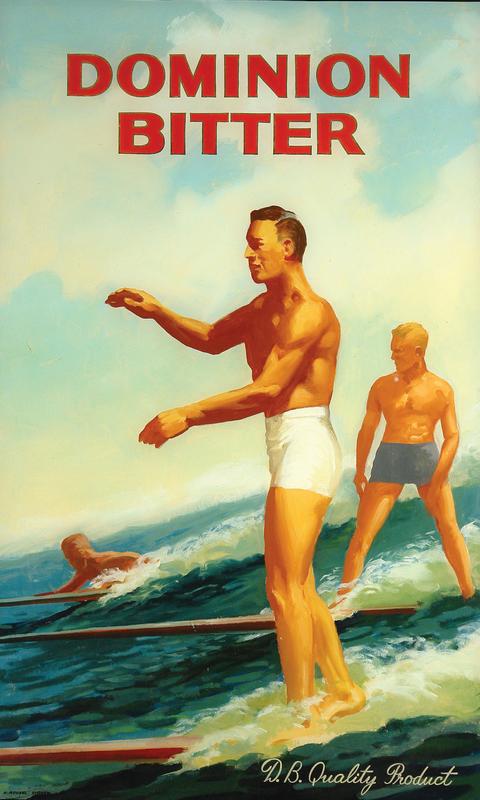 MR. HENRY ROUSEL.
MR. HENRY ROUSEL.References and Extras:
(1.) Australian pub. (2014, September 6). In Wikipedia, The Free Encyclopedia. Retrieved from http://en.wikipedia.org/w/index.php?title=Australian_pub&oldid=624473928
2. Beer in Australia. (2014, September 7). In Wikipedia, The Free Encyclopedia. Retrieved from http://en.wikipedia.org/w/index.php?title=Beer_in_Australia&oldid=624482799
RESCH'S WAVERLEY BREWERY. EMPLOYEES' ANNUAL PICNIC.
The annual picnic of the above brewer was held on Saturday at Pearl Bay. The employees with their wives and families and other friends, numbering altogether about 150, assembled at the Circular Quay at 11 o'clock, and proceeded by special steamer to their destination. On arrival there games of various descriptions were indulged in, also singing and dancing. An adjournment to the pavilion for luncheon was then made, when the chairman (Mr J.J. M'Garry) proposed the health of Mr. and Mrs. Resch and prosperity to the Waverley Brewery, to which the brewer (Mr. H. Hore) responded. The health of the ladies was proposed by Mr. D Jones and responded to by Mr W. Scott. The various trophies, presented by Messrs, Holdsworth, Macpherson, and Co , J. Macintosh and Sons, J Scholes, J H. Alvarez, and others wore then competed for. The successful competitor for Messrs Holdsworth and Macphersons prize was Norman Spence in the All-comers' Handicap. For Messrs J. Macintosh and Sons' prize he was also the fortunate winner. The prize presented by Mr Scholes was won by Joe Breheny. The Married Ladies' Race was won by Mrs Alfred Tindal, with Mrs D. Jones second. The Boys' Race was won by S. Kenny. A very pleasant outing was brought to a conclusion about7 30, after all the children had been made the recipients of various toys at the hands of Mr. W. Ashton. RESCH'S WAVERLEY BREWERY. (1898, March 16). The Sydney Morning Herald (NSW : 1842 - 1954), p. 8. Retrieved from http://nla.gov.au/nla.news-article14166212
Resch's Waverly Brewery.
In brewery building the development of' Resch's' reads like an 'Arabian Nights'’ story. From small beginnings in the arid West of New South Wales, Mr. Edmund Resch the founder of the business, has within recent years made his name one to conjure with, and his brewery business second to none in the Australian Continent. The lager turned out by the firm is spoken of as being equal to the best German and American beers, and being especially brewed for the Australian climate, is indeed more- palatable than the imported brand. The brewery itself is under the management of the two sons of the proprietor. Messrs. Edmund Resch, junr., and Arnold Resch, who possess that thorough practical knowledge of and training of their father's business which is only to be acquired in countries of older growth than this- After passing through the prescribed course at the Academy of Brewing, Munich — which, by the way, is regarded as par excellence the European centre for mastering all that makes for good brewing in its theoretical and chemical aspects — the young men acquired that thoroughly practical experience which they devote to the business which they have so successfully managed. Mr. John H. Alvarez, Mr. Resch's trusted lieutenant, has been favourably known in the Australian brewing work for the lengthy period of twenty years. At first associated with Messrs. Burrows and Gleeson, he later on filled a position of much importance with Allt's Brewing Co., finally, when the business of that company was taken over by Mr. Resch, entering the service of the last-named gentleman. His association with the fortunes of the firm has been very intimate, and his talent, geniality, administrative ability, and other outstanding qualities have made him hosts of friend throughout the country. It is a matter of common knowledge that, until the moment of Mr. Resch's coming to its rescue, the lager beer industry in this State was inevitably doomed to extinction. When one reflects upon how this industry has developed since, it came under his wizard touch, it is hard to imagine that only a very short time ago its grave was quite ready to receive it. Now it possesses quite as much vitality to the square inch as any other branch of the brewing industry, and its prospects are bright in the extreme. Reflecting upon these facts, the writer lingered awhile in that portion of the establishment devoted to the manufacture of this delightful product, and came away charged with the following information : — The lager bier reaches a cellar where the temperature is close to freezing point, and is fermented in large steel tanks coated throughout inside with glass enamel. Thence it finds its way to rooms containing a series of immense cleansers, where it remains until sufficiently ripe for the market. Lager bier never goes 'out until after it is four months old ; bottled ale is stored from two months to ten weeks, while the bulk is ready for the market, a comparatively short time after its manufacture. Resch's Waverley Brewery. (1902, November 22). Freeman's Journal (Sydney, NSW : 1850 - 1932), p. 38. Retrieved fromhttp://nla.gov.au/nla.news-article111069058
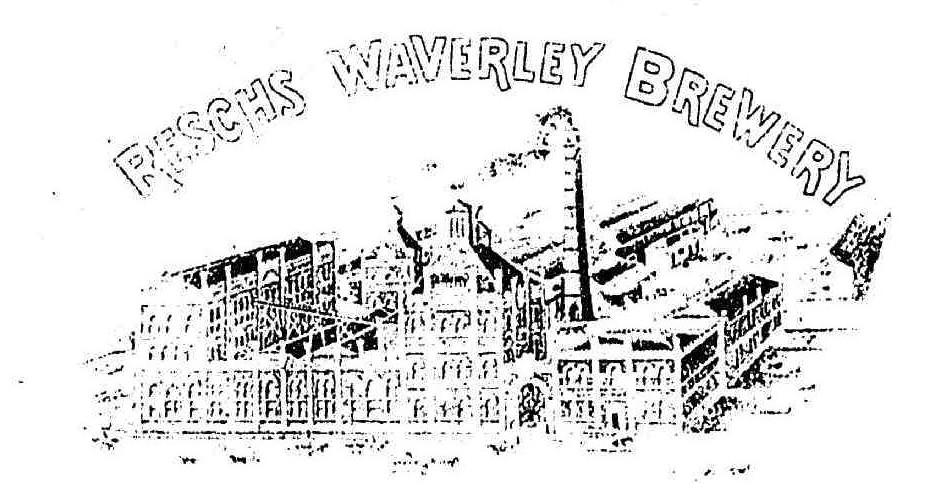
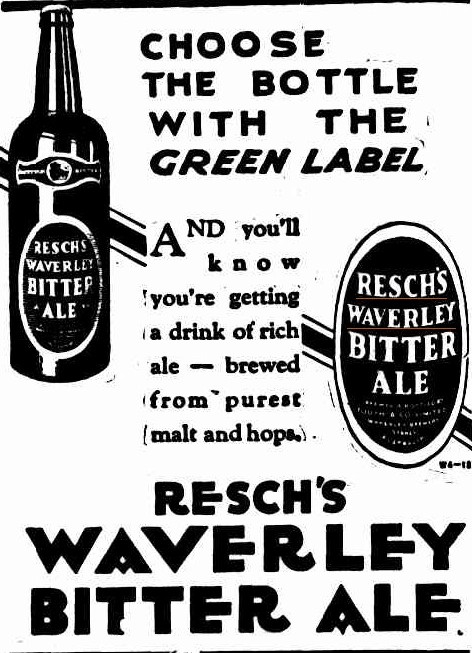 RESCH'S WAVERLEY BREWERY.
RESCH'S WAVERLEY BREWERY.
A very attractive display was made at the kiosk occupied by Roach's Waverley Brewery, all its productions being set out very effectively. Mr. Resch was successful in obtaining first prize for his famous lager beer, and also secured a similar high honour for an exhibit of select stock ale. The Waverley Brewery at
Redfern stands as a fitting monument; to the sterling business qualities of its proprietor, Mr. Edmund Resch. Year by year its buildings cover more and more ground, the premises being extended in order that the increasing demands may be successfully grappled with. The brewery is a large and handsome pile crowned with heavy towers and smoke stacks. At the same time, nothing that could be considered conducive to the more efficient handling of the' products has been omitted, every improvement appealing to Mr. Reach's knowledge and experience being adopted, no matterwhat the expenditure incurred. The operations of the brewery are of a very extensive nature, and the popularity of the lager and ales put on the market by Mr. Resch is great, and still increasing. The well-merited honours gained at the show should give a further impetus to the output. RESCH'S WAVERLEY BREWERY. (1903, April 17). The Sydney Wool and Stock Journal (NSW : 1899 - 1917), p. 14. Retrieved from http://nla.gov.au/nla.news-article113423177
A VISIT TO RESCH'S BREWERY
An enjoyable function took place on Wednesday afternoon at Resch's Brewery, when some 150 members of the N.S.W. Country Press Association accepted the invitation of the Messrs. Resch to inspect the brewery buildings and machinery. The visitors were shown all through the brewery by Mr. Arnold Resch. and were then conducted to the refreshment-room. In the absence of Mr. Edmund Resch, Sen., who is in Europe, Mr. Alvarez, the secretary of Resch's. asked Mr. Grogan, the president of the association, to preside. The toast of 'The King' having been honored, speeches were made by the chairman, by Mr. M'Millan, Mr.Temperley, and Mr. Shakespeare, of the visiting Pressman, and by Mr. Arnold Resch and Mr.Alvarez, of the brewery staff. Mr. Grogan, on behalf of the Country Press, pointed out that the Messrs. Resch were doing the right thing in proving that Australian lager beer and stout were not only equal to those of other countries, but were better suited to our climate and requirements; and in wishing the -Messrs. Reschevery success he trusted that their example would be followed in every other branch of industry. There was no reason whatever, why we should not produce all raw materials that we require, but also that we should manufacture all that we require as well. A VISIT TO RESCH'S BREWERY. (1908, August 21). Evening News (Sydney, NSW : 1869 - 1931), p. 5. Retrieved from http://nla.gov.au/nla.news-article114751893
Display Advertising. (1934, January 8). The Canberra Times (ACT : 1926 - 1995), p. 4. Retrieved from http://nla.gov.au/nla.news-article2326310
BREWERY MERGER - Tooth's and Resch's. SOLICITORS' BILLS OF COSTS.
Some sidelights on the merging of Resch's brewery undertaking into Tooth and Co, Ltd ,were given in an application which came before Mr Justice Harvey, Chief Judge in Equity yesterday, when the Court was asked to refer to the Deputy Registrar in Equity two separate bills of costs, rendered by Messrs. H.J. Aspinall and Son, solicitors. One bill is for professional services rendered before the liquidation, and the other for work done for the liquidators and the company during the winding-up. The whole of the shares in the company are held by Edmund and Arnold Resch, the two sons of the late Mr Resch ,and the application was made to the Court on behalf of Edmund Resch and William Oliver Hopkins, two of the three voluntary liquidators (the third is Arnold Resch) and Messrs Aspinall and Son. In addition, applicants asked for an order that, after the bills had been taxed, the amount due should be paid out of the assets of the company.
In their affidavit, Edmund Resch and W. O. Hopkins set out that Resch's decided to windup voluntarily in July, 1929, when they and Arnold Resch were appointed liquidators. The sale of Resch's brewery undertaking to Tooth and Co, Ltd, had been completed, with the exception of the execution of a few formal documents. The only outstanding debts of the company were assessments for land and Income tax not yet received by the liquidators, and for income tax not yet payable.
Arnold Resch's affidavit stated that he was one of the liquidators, and asked that, if the bills of costs were referred to the Deputy Registrar In Equity, leave should be granted to him to be represented there-at. The two bills of costs, he declared, consisted of one for £5477, rendered to the company, and the other for £6573/6/10,rendered to the liquidators, and the amount which might be found due to Aspinall and Son in respect of them would become payable in equal shares, by him and his brother, in as much as they were the only persons now interested (and that in equal shares) in the assets of the company, of which those not yet distributed by the liquidators did not exceed £1000 in value. The first bill expressed to cover costs in connection with the preparation of an agreement, dated June 29, 1929, under which the company agreed to sell certain freehold and leasehold properties and certain movable plant and goodwill to Tooth and Co, Ltd, for a consideration, which, under the agreement was to be satisfied by the allotment by Tooth and Co., Ltd, to Resch's, Ltd., or its nominees, of certain shares in Tooth and Co., Ltd. The second bill was in connection with the preparation of an agreement, dated July 31, 1929, for the sale, by himself and co-liquidators, to Tooth and Co, Ltd, of the same property for the same consideration, but by way of cash instead of shares, as that expressed in the agreement of June 29, 1929, and also to cover the conveyancing work performed in carrying to completion the agreement for the sale. There was only one agreement for the sale by Resch's, Ltd, to Tooth and Co, Ltd, and he had been advised that Aspinall and Son were not entitled to charge as though there had been two agreements, constituting entirely separate and independent trans-actions. There was also some question as to whether they were not merely entitled to the lower scale of charges. He also knew that, together with the bills of costs referred to, Aspinall and Son rendered to him and his brother, personally, a bill of costs for£819/16/1 in connection with another agreement, dated June 29, 1929, for the sale by his brother and himself of certain freehold property to Tooth and Co, Ltd. The total amount of the three bills of costs was£12,870/2/11. He further alleged that the solicitors rendered to the liquidators of Resch's, Ltd, on March 13, 1930, a memorandum of their costs, headed "Sale to Tooth and Co, Ltd.," and totalling £10,774/16/10.After its receipt it was considered by the liquidators, and it was resolved to request the solicitors to furnish details of their costs. It was in response to that request that they had furnished the bills of costs for £5477and £6573, respectively.
It was announced that the matter had been settled, and, by consent, his Honor made an order that the two bills of costs be referred to the Deputy Registrar in Equity to tax and certify as to the work done by Aspinall and Son, both before and during the liquidation of the company, and that the amounts found to be due, as well as the costs of the application, should be paid out of the company's assets by the liquidators, that the respondent was entitled to appear at the taxation, and that Messrs Stephen, Jaques, and Stephen act as solicitors for the company and the liquidators other than the respondent, and for the contributories and creditors there-in at the taxation Further consideration, and all further costs, were reserved. BREWERY MERGER. (1930, June 26). The Sydney Morning Herald (NSW : 1842 - 1954), p. 16. Retrieved from http://nla.gov.au/nla.news-article16661787
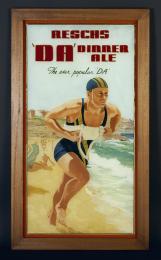 Edmund Resch Park
Edmund Resch Park
Edmund Resch Park lies within the Moore Park Gardens apartment development between South Dowling Street and Bourke Street, Redfern. This was the former site of Resch’s Waverley Brewery, centre of the brewing business of Edmund Resch. He was ‘brewer by appointment to His Excellency the Governor-General’ from 1904 to 1914, but was interned as an enemy alien in 1917. He died at his home ‘The Swifts’ at Darling Point in 1923.
In 1929 Resch’s Waverley Brewery was taken over by Tooth and Co but the Resch’s brand continued for many years. Resch’s Dinner Ale was one of Sydney’s most popular beers for many decades. The brewery finally closed in 1983. Following demolition of most of the buildings the site was redeveloped by Dealruby Pty Ltd as Moore Park Gardens apartments in the 1990s and this park within the development was opened in 1996.
Alcohol advertising often used lions and horses to symbolise strength, health and manly stamina. The poster advertising Edward Latham's Carlton Prize Ale [vol. 29, p. 20] shows jousting knights, the drink being supposed to conquer all, having secret ingredients which made it wholesome, pleasant and popular. The poster advertising S.G. Elliot & Co. Blackhorse Brewery [vol. 29, p. 21] is another example, while Empire Pale Ale [vol. 29, p. 10], ca. 1907- ca. 1913, invoked the Empire to appeal to consumers. And for the abstainer, or for those with liver damage from too much alcohol, there was Dandelion Ale from Tasmania [vol. 14, p. 16], promised to cure the liver, purify the blood and assist digestion.
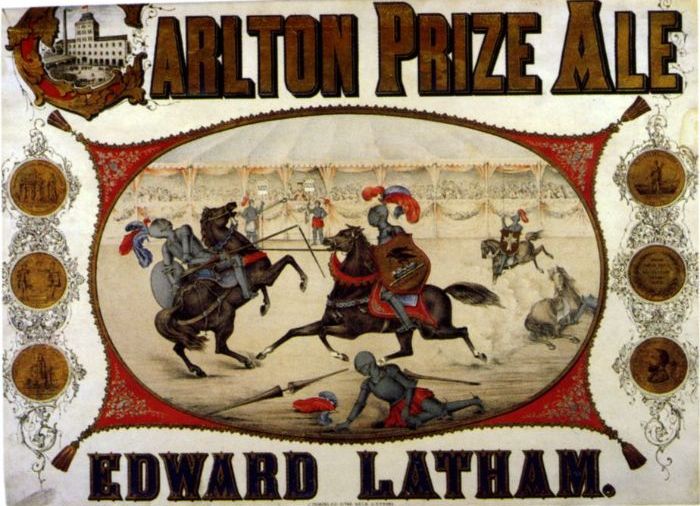
Above: Poster for Carlton Prize Ale. Troedel Collection, vol. 29, p. 20. La Trobe Picture Collection. See: http://www.slv.vic.gov.au/latrobejournal/issue/latrobe-62/t1-g-t7.html
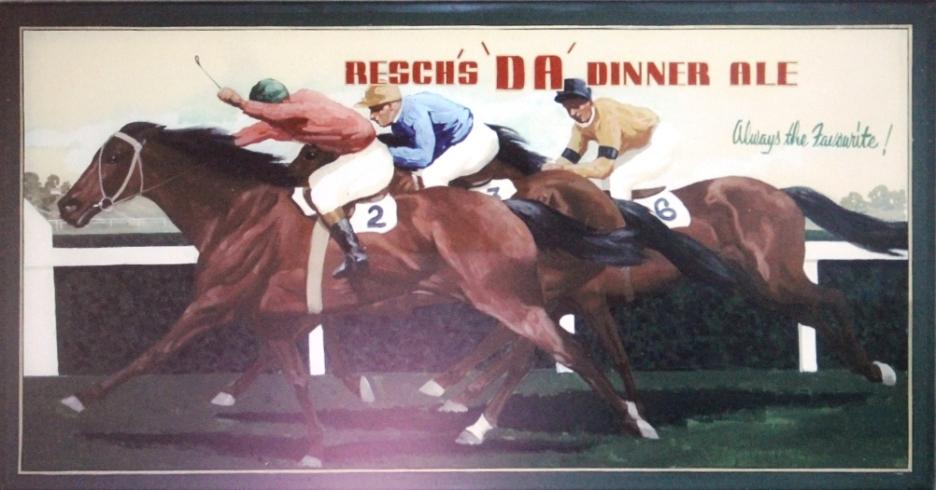
Pub painting, advertising, framed, 'Always the favourite! Resch's 'DA' Dinner Ale', oil paint and gold leaf on glass and steel framed, RB Coleman Signs, Sydney, Australia, 1957: The painting was produced by RB Coleman Signs, of Canterbury, Sydney. Alone among the five companies which produced advertising paintings for Tooth & Co, Coleman Signs did not paint the company name in the lower border, leaving it as in this example. The style of the sign writing also matches that of other paintings by Coleman's while the artistic style of the painting (notably the bold pastels of the jockey's silks) is more straightforward than those of the earlier generation of pub painting artists. This information was confirmed by the Tooth & Co company papers held by the Noel Butlin Archive, Canberra. One of the existing glass paintings at the Royal Hotel, Ryde, was 'renovated' by Coleman Signs at a price of £20/14/4. The painting is probably the work of Graeme Inson or Murray George, artists frequently used by Coleman Signs during the 1950s and 1960s. Read more:http://www.powerhousemuseum.com/collection/database/?irn=344670#ixzz3EN4KByjM
Researched and compiled by A J Guesdon, 2014.